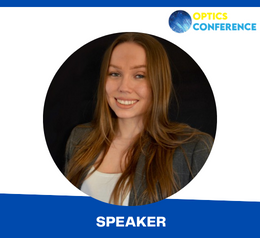Scholars 2nd Edition International Conference on
Optics, Lasers and Photonics
THEME: "A New Era towards Optics, Lasers & Photonics Technologies"
 27-28 Mar 2023
27-28 Mar 2023  Crowne Plaza Ealing, London, UK & Online
Crowne Plaza Ealing, London, UK & Online THEME: "A New Era towards Optics, Lasers & Photonics Technologies"
 27-28 Mar 2023
27-28 Mar 2023  Crowne Plaza Ealing, London, UK & Online
Crowne Plaza Ealing, London, UK & Online 
University of Erlangen-Nuremberg, Germany
Title: Improving the optical properties of achromatic lenses due to the process conditions
I am a scientific assistance at the Institute of Polymer Technology, Friedrich-Alexander-Universität Erlangen-Nürnberg. My current focus is a DFG (German Research Foundation) project on the production of achromatic lenses using composite injection molding of transparent polymers. I hold a Bachelor's degree in Industrial Engineering with a major in Mechanics which I graduated in April 2020 and a Master's degree in Applied Plastics Technology which I graduated in November 2021, both from Schmalkalden University of Applied Sciences. I am originally from Venezuela and have been living in Germany since 2015.
Transparent
polymers have gained considerable attention as materials for precision optical
components due to their light weight and ability to be produced in large
quantities by injection molding. Another advantage of using an injection
molding process is the possibility to produce multi-component parts without the
need for an additional adhesive. A good example is the production of achromatic
lenses. Achromatic lenses are often used in optical applications, such as car
headlights and cameras, to correct chromatic aberrations. This study focuses on
the influence of process parameters on the optical properties of achromatic
lenses manufactured by isothermal and variothermal injection molding processes.
The lenses were made from a combination of two materials, polycarbonate (PC)
and polymethal methylacrylate (PMMA). The process parameters were
systematically varied and the resulting material optical properties were
analyzed using appropriate analytical methods. The use of high holding pressure
(700 bar) for the first component (PC) combined with the variothermal injection moulding process exhibits good optical properties in achromats, and an
additional step of oven bedding to reduce residual stresses improves these
optical properties further. The results of this study will provide insight into
the optimal choice of process parameters for the injection moulding of
high-quality achromatic lenses made of PC and PMMA.